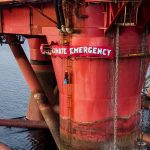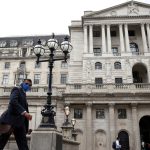Shell has reported record operating profits of $9.1bn (£7.2bn) for the start of its financial year though its bottom line was hit by the cost of the company’s phased withdrawal from Russia over the war in Ukraine.
The FTSE 100 energy firm booked a $3.9bn charge related to its decision to exit the Russian market, including its joint ventures with Gazprom, which was revealed in March.
It is also ending oil and gas trading with Russia.
But the company said a strong performance by its trading arm, alongside higher oil and gas prices, helped its core adjusted earnings up by 43%.
The $9.1bn sum was the highest first quarter level achieved by the company and beat the expectations of analysts.
The writedown over Russia meant its income attributable to shareholders profit measure was down by 38%, Shell said, at $7.1bn.
The results, however, reflect a golden earnings season for the company and its competitors including BP thanks to the high price environment.
Bank of England expected to raise interest rate to 13-year high to tackle inflation
US Federal Reserve increases interest rate by 0.5% to combat inflation – the biggest hike in decades
Ukraine war: EU plans Russian oil ban by the end of the year in new package of sanctions
Shell said it would reward shareholders with a planned 25 cents a share dividend – a rise of 4%.
Dividend payments and share repurchases during the January-March quarter reached $5.4bn, the company revealed, as it continues its plan to buy back $8.5bn in shares during the first half of 2022.
It expected shareholder distributions to exceed 30% of cashflow in the second half of the year.
Freetrade senior analyst Dan Lane said the shareholder rewards were eye-catching in the current energy price environment.
“Dividends are in full flow and, like BP earlier this week, so are the share buybacks.
“But, just like BP, the stream of renewables businesses Shell has been snapping up gets only a nod towards the bottom of the page. It’s a growing area of the business but it’s still a minuscule part of Shell’s earnings,” he wrote.






















